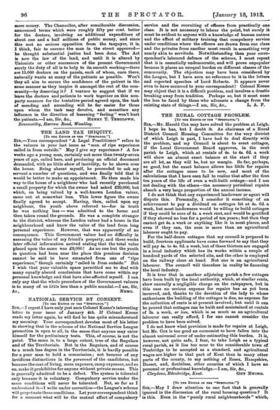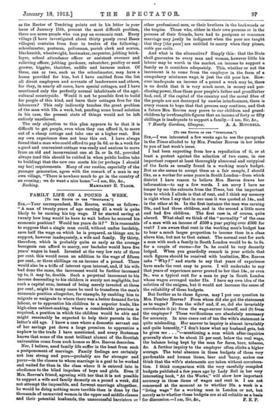[To Tee EDITOR OP THE "5PECTATOR."1 SIR,—May I draw attention
to one fact that is generally ignored in the discussion of the rural housing question P It is this. Even in the "purely rural neighbourhoods" which,
as the Rector of Tendring points out in his letter in your issue of January 11th, present the most difficult problem, there are some people who can pay an economic rent. Every village (I have investigated about thirty purely rural Essex villages) contains from four to twelve of the following : schoolmaster, postman, policeman, parish clerk and sexton, blacksmith, wheelwright, bootmaker, carpenter, jobbing bricklayer, school attendance officer or assistant overseer and relieving officer, jobbing gardener, ratcatcher, poultry or seed grower, higgler, thatcher, saddle and harness maker. Of these, one or two, such as the schoolmaster, may have a house provided for him, but I have omitted from the list all direct employees and servants of landowners and others, for they, in nearly all cases, have special cottages, and I have mentioned only the perfectly normal inhabitants of the agricultural countryside. Would it not be possible first to build for people of this kind, and leave their cottages free for the labourers ? This only indirectly touches the great problem of the man with 13s. a week, but, pending some broad solution in his case, the present state of things would not be left entirely unrelieved.
The only objection to this plan appears to be that it is difficult to get people, even when they can afford it, to move out of a cheap cottage and take one at a higher rent. But any own experience does not bear this out. I have always found that a man who could afford to pay 3s. 6d. or 4s. a week for a good and convenient cottage was ready and anxious to move from an old and inconvenient one at 2s. or 2s. 6d., provided always (and this should be rubbed in when public bodies take to building) that the new one meets his (or perhaps I should say her) requirements. Many of our rustics, especially of the younger generation, agree with the remark of a man in my own village, "There is nowhere much to go in the country of an evening ; we do want a nice home."—I am, Sir, &c.,
Boding. MARGA.RET E. TABOR.







































 Previous page
Previous page